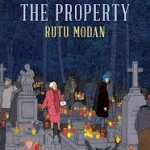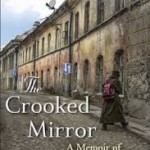In earlier drafts of my book (I’m still writing it) I vehemently opposed the idea of visiting Poland in order to bring closure to my story. I bemoaned that “going back” to the place where I’d never actually been held no appeal to me. I went so far as to state that the only real lure for me is the siren’s song of my great-grandfather’s paintings still in Poland. So I must now admit that my perspective has changed. One sign of this is my increasing focus on and interest in reading books about other’s trips to Poland and the warming of Polish-Jewish relationships. Two newly published books in this genre are Rutu Modan’s The Property (a graphic novel based loosely based on a family story) and Louise Steinman’s The Crooked Mirror: A Memoir of Polish-Jewish Reconciliation (a memoir chronicling several different trips to Poland between 2000 and 2009).
In Modan’s graphic novel, The Property, Mica, a woman in her 20s, travels with her grandmother from Israel to Warsaw to reclaim the deed to an apartment the family was forced to abandon during the Second World War. What begins as a story about wartime looting and a demand for recovery evolves into a well told and beautifully illustrated tale with complications involving relationships, half-truths, memory, money, and nostalgia. It’s an intricate and personal tale that illuminates the complex legal, emotional, and psychological challenges plaguing families in the aftermath of the Second World War; challenges that persist even now, nearly 70 years after the conflict officially ended. The form of the graphic novel allows Modan to explore this muddled yet highly nuanced story both textually and visually. In some ways the book’s plot is a classic case of linguistic and social miscommunication which compels readers to carefully read characters’ expressions and visual cues to perceive the multiple layers of meaning.
In addition to the deep and appealing use of the medium, the subject matter of The Property is very interesting to me. I personally experience many of the issues and complexities surrounding the repatriation of Jewish property in Poland, since at least 54 of my great-grandfather’s paintings reside in Polish museums. It is from this personal vantage point that I am grateful and appreciative of Modan’s efforts to unravel the tale from a multitude of perspectives and to illuminate a socially, politically, and emotionally difficult story. She understands there are nuances that are not only difficult to explain, they are difficult to bring up. Her book begins with what may appear to be a simple mission – a woman returning to Poland to reclaim what is rightfully hers. It then twists and veers in a variety of directions as the highly engaging characters navigate difficult terrain, coming to understand and share the same story from their various unique vantage points.
In many ways Louise Steinman’s older book, The Souvenir, published in 2008, reminds me of Modan’s The Property. While Modan’s story is about those seeking to recover a wartime taken property, The Souvenir is about a woman who discovers a Japanese flag inscribed to an unknown and mysterious Yoshio Shimizu amidst her father’s personal effects. She soon realizes that her father took the flag as a souvenir during his service in the Pacific and she comes to the conclusion that she must return it to the family of the man from whom it was taken. Her quest for repatriation from the other side of the coin is a tale from a rare perspective. But Steinman is both sentimental and practical about the matter. The flag once held meaning to her father, but he is deceased and for her the right thing to do is to return it to the man’s heirs, for whom it is likely to hold so much more meaning and importance. Unlike many stories, it’s not a quest for whether she will return the flag, but how she will discover to whom it belongs. What she discovers is that the return of the flag itself is just a first step in building a bridge across the emotional wounds of war and loss.
While The Souvenir and The Property are both about the issues surrounding physical property taken during wartime, Steinman’s new book, The Crooked Mirror, is about both a physical and a metaphorical return to Poland. Unlike in The Souvenir in which Steinman sought to return a physical item, she is not seeking a physical object; instead seeking symbolic experiences that will help remember the Jewish people and communities that once thrived within Poland.
The road to uncovering family stories and history is never straight and clear: there are always twists and turns, mysteries, and unknowable fragments lost to history. Steinman knows this and ventures down her own path with an open mind and a keen sense of Polish-Jewish history. In her search for the remnants of her family’s history, Steinman forthrightly shares and addresses the many tense issues standing in the way of meaningful understanding between Poles and Jews. Her overall narrative weaves not only her own personal story into the larger landscape of Polish-Jewish relations, but also that of a fellow traveler, Cheryl, an American-born Polish Jew whose father was interned in a Soviet labor camp during the Holocaust, whose mother and sister were shot and buried in a mass grave in a forest near his home town, and who was shot at by townspeople when he tried to return to his home in Kolomyja at the end of the war.
I love Cheryl. I see myself in her. Her uncensored voice in the story reflects my own apprehension about how I might experience present day Poland through the lens of my own family’s story. Cheryl is highly aware of the irony of returning to a “homeland” that retains so little of what once made it home. This is emphasized by the reticence of her father, who is perplexed his daughter wishes to visit not only Poland, but the very town where he lost everything. I have many favorite lines in the book from Cheryl, but I know exactly how she feels when she tells Steinman dryly, “I don’t travel to mass grave sites with anyone but you.”
I recently told my father that I’m planning a trip to Poland for the fall of 2014 to film much needed footage for my Chasing Portraits documentary film. I also told him I am not willing to go by myself. I will travel with a good friend who has been a big behind-the-scenes helper in the documentary film project and a cousin who has lent much support along the way. My father was not surprised by my announcement. He understands that given the trajectory of the documentary film project my visit is inevitable, but like Cheryl’s father, he feels substantial reticence regarding a visit. He told me, “you’re the only member of the family who has ever wanted to go back.”
Of course, my trip will not be a vacation, and it will be emotionally difficult. I am grateful for the tasks I’ll have to focus on, (interviewing and filming) so that I will have less time to dwell on the negative events and associations of the past. I am indebted to those who have made “the return trip” before me and I take great comfort in the advice and guidance that those like Modan and Steinman offer to apprehensive travelers like myself.

